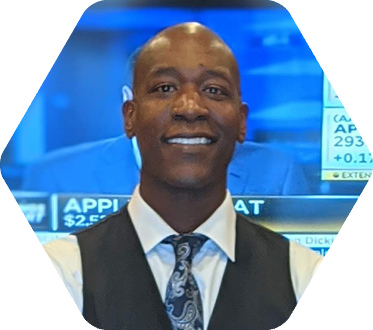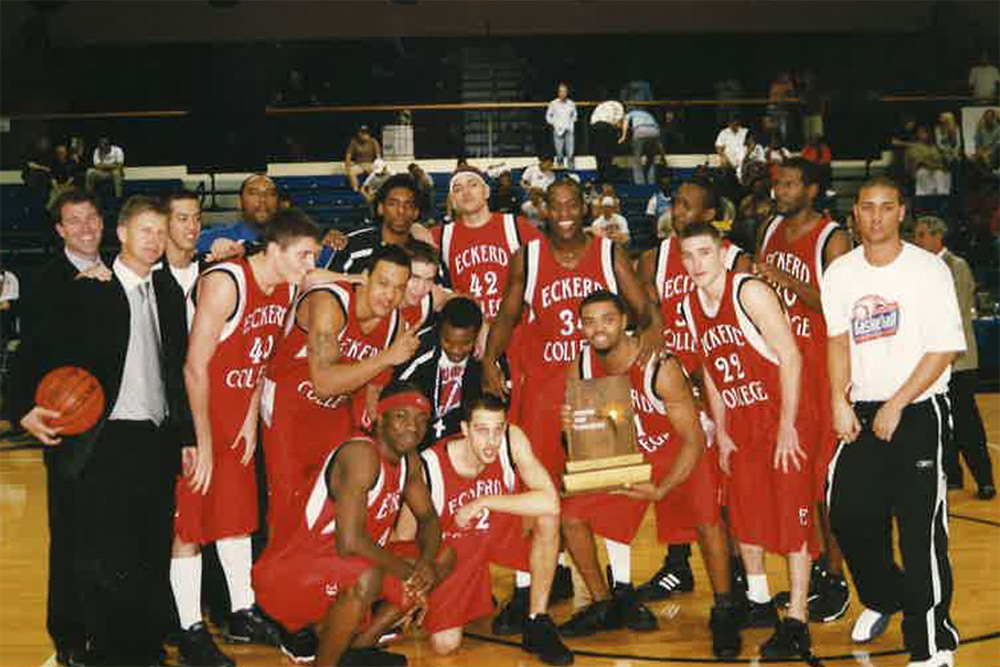Class of 2005
Charles Bryant ’05 carves his own path, a fact made obvious just by the name of the financial advising firm he started, Lone Star Wealth Management.
And while he’s not a fan of saying any one experience made him who he is today, the management graduate and Men’s Basketball alumnus credits Eckerd with being a critical juncture on his path to maturity. Now, he hopes to help other young people, especially people of color and women, on their journeys to success.
“Eckerd helped me with my emotional quota and how to handle tough decisions,” he says. “Some of the people I came across really helped me become a better decision-maker rather than a better student.”
In 2003, one of those decision points presented itself. His father, whom he hadn’t seen in years, became the leader of Liberia—a development Charles found shocking because his family had never been political. He had to choose whether to stay at school and continue in his role with the basketball team or spend time with his newly powerful father.
“Imagine being 22 years old, hearing this. How do I express pride in a man that didn’t take pride in being a father?” he says. “I think that’s where the maturity really started to kick in. I don’t want anyone judging me based on anything except what I do. I wanted to prove I was my own man.”
He chose to stay at Eckerd, a choice he feels strongly was the right one. That year, the team made it all the way to the NCAA Division II Elite 8—the only Eckerd team to ever do so—and left him with close relationships for life. The entire experience, though, got Charles thinking that he wanted more for himself than the socially focused college life he had enjoyed up to that point.


Charles Bryant (middle row, center) with the 2003 Eckerd College Men’s Basketball team
Matt Kilgroe ’87, a former Eckerd basketball player himself and a current Eckerd trustee, hired Charles for an internship at Merrill Lynch, and former Management Professor Donna Trent helped him keep his eye on the ball academically. Charles’s first job out of college was selling cars, and then Kilgroe recruited him back to Merrill Lynch.
“He’s opened the door not only for me but for a lot of other people,” Charles says of Kilgroe, a tradition Charles hopes to pass along. For the past few years, he has been actively seeking Eckerd graduates to join his firm.
“There aren’t a lot of young men my age—let alone African American men my age—who have been able to survive and even thrive in the private wealth management space,” he says.
That’s not to say Charles hasn’t faced obstacles. Reflecting on his years in the business and whether he has faced discrimination, he says that “countless times” he can remember feeling down and depressed due to a lack of opportunities he knew he was qualified for. But he says a positive outlook propelled him forward.
“It provided me with the perspective that, fortunately or unfortunately, things were going to be difficult,” Charles says.
In addition to Merrill Lynch, Charles worked at Morgan Stanley, SunTrust, Chase and Mutual of Omaha before starting Lone Star. Realizing that opportunities would be scarce at those firms, he says being independent allowed him to take full advantage of the relationship building that he considers a core strength. Now in year 14 as an advisor, most of his clients have been with him for more than a decade. Any wealth management firm can help clients earn interest on their wealth and protect their assets, Charles notes. What he says sets him apart is his active listening and ability to address what keeps his clients up at night on a more emotional level.
“It takes a lot more than economics and finance to be a good financial advisor,” he says. “I’m more of a counselor than I am a financial advisor.”
In the future, Charles wants to grow his firm and provide opportunities for people who don’t see themselves reflected in the traditionally older, whiter, maler private wealth management industry. He encourages those young people to focus on their goals despite the messages that may try to dissuade them.
“Somebody’s opinion isn’t a fact,” he says. “I wouldn’t be where I am today if I’d let people’s opinions about me change who I was.”

